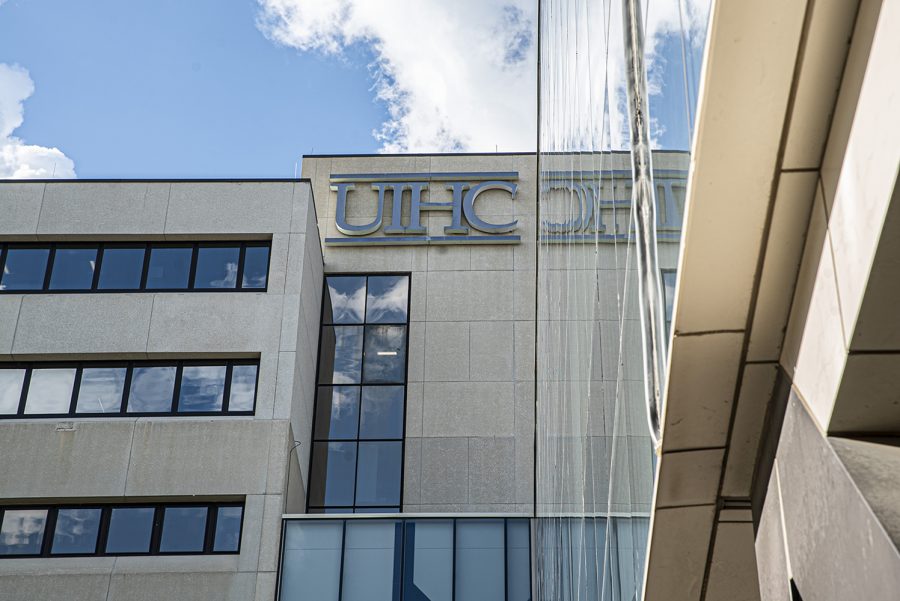UI Hospitals and Clinics administering antibody treatments to COVID-19 patients, reducing hospitalizations
UIHC is one of the sites distributing the Regeneron monoclonal antibody to patients who are experiencing mild to moderate symptoms of COVID-19.
University of Iowa Hospitals and Clinics are seen on Tuesday, June 23, 2020.
December 9, 2020
The University of Iowa Hospitals and Clinics hopes to use an experimental treatment for patients who test positive for COVID-19, the Regeneron monoclonal antibody. This may prevent future hospitalizations and UIHC is hoping to study how it can prevent patients who were exposed to the virus from getting it.
On Nov. 21, the Food and Drug Administration issued emergency use authorization for Regeneron’s antibody cocktail. In early November, Bamlanivimab, a similar antibody cocktail used for treating COVID-19 by Eli Lilly received emergency authorization. Emergency use authorization allows for treatments to be used for patients in specific circumstances, as they wait for more clinical trial results to receive full approval.
UIHC is one of the sites that have begun distributing these treatments to patients. UI Vice President for Medical Affairs Brooks Jackson said the hospital started using the Bamlanivimab treatment on Nov. 23.
Offsite Ambulatory Programs Director Rami Boutros is leading the team who is administering both antibodies. A clinical and pharmacy team is giving the treatments to patients at Iowa River Landing.
Patients who can receive the treatment have to test positive either at UIHC or report to the hospital that they’ve tested positive somewhere else, Boutros said. He said the treatment is meant for mild to moderate COVID-19 cases and should not be given to patients who are hospitalized. After determining that a patient is a candidate, their risk score is based on underlying health conditions and age.
“The key for this is early diagnoses — making sure that the patients get the testing as soon as they have symptoms. We are also looking at the patients who have high risk factors,” Boutros said. “We have a limited supply, so we are prioritizing patients who have the potential to get sicker than others.”
RELATED: From the COVID-19 unit: what Iowa health care workers want you to know
The director went on to say the goal for these treatments is to help patients who are at higher risk to stop them from deteriorating and needing to be hospitalized. The hospital is using an alternating methodology, meaning they switch between Bamlanivimab and the Regeneron treatment. Each patient receives one of the drugs, depending on the supply.
Earlier this year, UIHC started a clinical trial for the Regeneron treatments casirivimab and imdevimab. The trial’s goal is to test the efficacy and the safety of the treatment in an effort to receive authorization for this treatment, as previously reported by The Daily Iowan.
While the emergency use authorization is good news, especially when it comes to keeping hospitalization rates down, Clinical Research Support Director Alejandro Comellas said the hospital will continue with the trial and plan to start a new one.
“Soon we will be starting a trial where we will be recruiting the household members of somebody who was diagnosed with COVID,” Comellas said. “We are hoping to start recruiting in the next few weeks.”
Unlike the current trial happening at UIHC — which focuses on patients who have tested positive for the coronavirus — the new trial will look at the effects of the Regeneron treatment on household members of patients who tested positive.
Comellas said the current results are promising, which is why the FDA approved the treatments for emergency use. However, he maintained that it is important for the clinical trials to continue to receive full authorization and test how the treatment can help people who haven’t tested positive.
RELATED: UIHC participating in Regeneron clinical trial, testing treatment for COVID-19
“This trial is helping us in understanding how to target the spike in the virus that binds to the cell, which seems to be fundamental for stopping infection,” he said. “This points out that this intervention can have a therapeutic effect, which can help in other infections or viruses in the future.”
With these new treatments and a vaccine expected in the next few weeks, Jackson added that he expects to see positive results in the hospitalizations and the number of positive cases across the state.
As of Dec. 9, there are 898 patients in the hospitals across Iowa, down from a high of 1,510 on Nov. 18, according to the state coronavirus dashboard. The 14-day positivity rate in Iowa is 15.9 percent.
Jackson said it’s essential for the public continue wearing masks, staying physically distant, and practicing good hand hygiene. Refraining from large gatherings is also important as the hospital prepares to treat and vaccinate these patients, he said.
“We’re seeing the light at the end of the tunnel with the vaccines coming and better treatments,” Jackson said. “At the same time, it’s going to take some time to implement these things. People need to still engage in safe practices for a little while longer, and we can’t let down our guard yet.”






